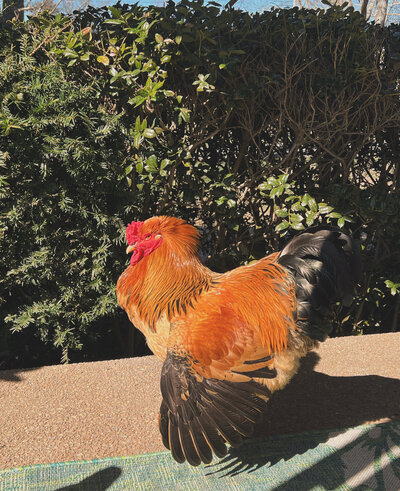deviflux
Songster
First time roo owner and wondering exactly what I’m dealing with and what the best resolution might be.
I’ve got a buff Brahma roo, approaching 1 year old. This is his first spring hormone period and on the last week his behavior has definitely changed.
In the afternoon when I’m walking to the coop to put out some food and lock them up, he comes running up behind me and attacks. This started first as a little surprise peck on the back of my leg and is now flogging/spurring. No aggression in the coop or while I’m actually doling out the food. In fact he steers very clear of me when I am inside with him and walking around outside. It seems more like he’s overexcited and doesn’t know how else to deal with it. It’s only ever that first sneak attack and if I turn and catch him early, he nearly falls over himself trying to stop the attack and run away.
I’ve been responding as I always have with him. Face him, make myself big, tell him no, move towards him and claim my space until he moves away. Other than these instances, he gives me my space and seems to realize I’m the boss.
Is this just typical teen hormones and testing his boundaries? Is there anything else I should be doing to assert my dominance? I kept him as protection for my free range girls, but I worry that he will start having these kind of interactions with guests/delivery drivers etc. and I can’t risk that.
I read this post and am wondering if too much emphasis is being put on treats/food and I should start putting out food when they aren’t looking and not calling them. Letting him lead them to the coop more naturally without me interjecting…at least for a bit? https://www.backyardchickens.com/articles/understanding-your-rooster.75056/
Picture of my handsome but way too stimulated, moody Rudy.
I’ve got a buff Brahma roo, approaching 1 year old. This is his first spring hormone period and on the last week his behavior has definitely changed.
In the afternoon when I’m walking to the coop to put out some food and lock them up, he comes running up behind me and attacks. This started first as a little surprise peck on the back of my leg and is now flogging/spurring. No aggression in the coop or while I’m actually doling out the food. In fact he steers very clear of me when I am inside with him and walking around outside. It seems more like he’s overexcited and doesn’t know how else to deal with it. It’s only ever that first sneak attack and if I turn and catch him early, he nearly falls over himself trying to stop the attack and run away.
I’ve been responding as I always have with him. Face him, make myself big, tell him no, move towards him and claim my space until he moves away. Other than these instances, he gives me my space and seems to realize I’m the boss.
Is this just typical teen hormones and testing his boundaries? Is there anything else I should be doing to assert my dominance? I kept him as protection for my free range girls, but I worry that he will start having these kind of interactions with guests/delivery drivers etc. and I can’t risk that.
I read this post and am wondering if too much emphasis is being put on treats/food and I should start putting out food when they aren’t looking and not calling them. Letting him lead them to the coop more naturally without me interjecting…at least for a bit? https://www.backyardchickens.com/articles/understanding-your-rooster.75056/
Picture of my handsome but way too stimulated, moody Rudy.
Attachments
Last edited:



